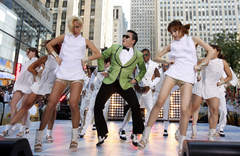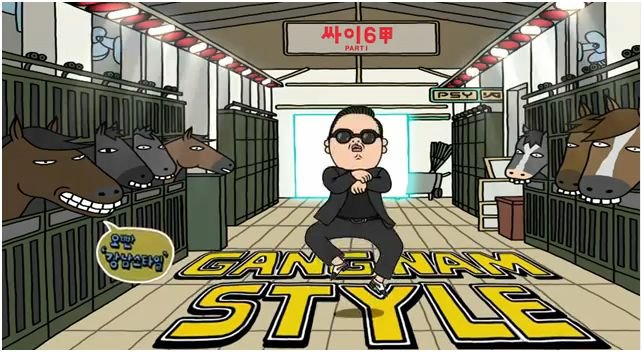Gangnam Style Translation
January 07, 2013
By Ofer Tirosh
The K-Pop Invasion
South Korean K-pop singer Psy is the first Korean singer/performer to top the charts in not only the U.S., but all over Europe and the UK. Psy's famous music video Gangnam Style, which went viral on You-Tube in August of 2012, has reached well over 1 billion views - a record-breaking achievement by far. Gangnam Style is a record-breaker in many ways: it is the first Korean language song to become popular in the U.S and the UK; the first K-pop song and artist to make it big outside of Korea, and the first video to surpass the amount of views previously held by Justin Bieber, on You-Tube.

Creative Korean Translation Needed for Oppa Gangnam Style
While there are many offerances of Korean to English translation out there for Gangnam Style lyrics, audiences do not care whether they understand the lyrics or not. Through music, dancing and visual humor, the level at which Gangnam Style strikes an immediate liking for all those who see and hear it, is one that can surpass the barrier of foreign language: which is something both remarkable and rarely found, indeed, especially because of the propensity for mainstream music audiences in America to learn and sing along to their favorite music.
For parents in nearly any part of the world, if you have children under 30, chances are they've seen the Gangnam Style music video on You-Tube - probably more than once. Psy's humorous and yet talented dancing, his hilarious video content, and his ascerbic jabs at the wealthiest social circle in South Korea are all reasons why Psy's music and his music video are such a hit, that the song has long since permeated many aspects of American culture, and grown far beyond the music video itself. There is even footage of President Obama doing the famous Gangnam Style horse-dance Psy created for the song. (It's not actually President Obama, but an actor dressed like him. However, he has admitted to dancing "Gangnam Style" to embarrass his daughters).
No, it is not immediate concern whether or not we understand Psy's Korean rap, or if we even really know what "Gangnam Style" is, or what "Oppan Gangnam Style" means. We love the song whether we understand it or not. But, due to its explosive worldwide popularity, the natural progression of interest and curiosity has led us to millions of fan inquiries, an interview by the New York Times, and hundreds of blogs, articles and Q&A's about Psy and Gangnam Style: Everyone wants to know what "Oppan Gangnam Style" means. And so, that question has also been answered many, many times. The literal translation is "Older Brother has Gangnam Style." So, why are all the English translations of the song's lyrics "Oppa has Gangnam Style" rather than "Big Brother?"
Because Korean to English translation for a song like Gangnam Style is sometimes best left in Korean:
"Oppa" is a Korean familial (casual ) term for an older brother by a younger sister, or for any slightly older male by a younger female. According to several sources which explore Gangnam Style lyrics in English - the term "Oppa" indicates a close relationship between a male and slightly younger female. So, Korean men love to be called this term, especially by women they find attractive. The closest equivalent within the pop mainstream music world is "daddy."
) term for an older brother by a younger sister, or for any slightly older male by a younger female. According to several sources which explore Gangnam Style lyrics in English - the term "Oppa" indicates a close relationship between a male and slightly younger female. So, Korean men love to be called this term, especially by women they find attractive. The closest equivalent within the pop mainstream music world is "daddy."
There is no exact equivalent term in English for Oppa, nor for Hyung, or Nuna, because these are all titles that a younger person uses to address an older person. There are even titles for students who are a year older than their younger counterparts. The English language does not use casual nor formal titles to this degree. So, while the closest Korean translation of "Oppan Gangnam Style" is "Older Brother is/has Gangnam Style," a transcreational (creative) Korean to English translation is closer to something like, "Daddy has Gangnam Style" or "Babygirl says I have Gangnam Style" or even just "Girl, check out my Gangnam Style." (I feel like I should note that this is not the official opinion of our professional Korean translation team.)
The video and the song itself is a parody; a satire about the Gangnam District of Seoul, South Korea. The country's most affluent and "shallow" community is located in the Gangnam District, which for many South Koreans outside of the district, incites both envy and resentment, disapproving of the Gangnam residents' lavish lifestyles and extreme wealth. By using silly antics, the signature horse-riding dance - which has come to be an international phenomenon - flashy, cheesy colors and lights and some very down-to-earth scenes - Psy is both singing and dancing the antithesis of Gangam Style in his music video.
If you haven't yet watched the most watched Youtube video in the world since August of 2012, nor listened to what is likely the most popular song in the world I highly recommend you do so.
Gangnam Style Music Video: http://youtu.be/9bZkp7q19f0
Why choose us

24/7 Human Support

1 Year Guarantee

95,000 Business Customers